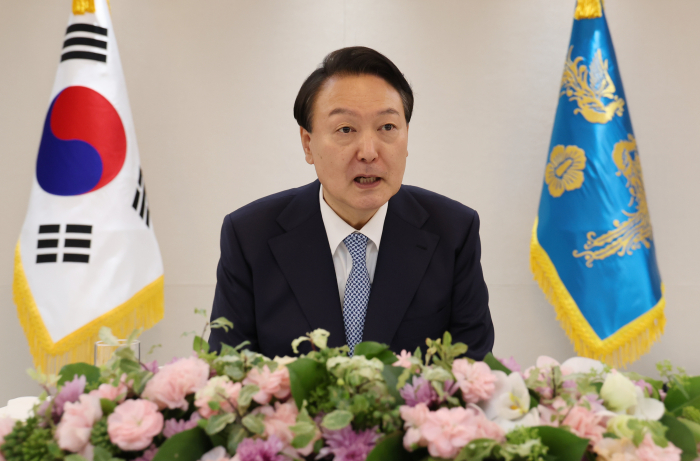Perspectives
Yoon’s ‘reform’ program is already sputtering
Aug 15, 2022 (Gmt+09:00)
4
Min read
Most Read
LG Chem to sell water filter business to Glenwood PE for $692 million


KT&G eyes overseas M&A after rejecting activist fund's offer


Mirae Asset to be named Korea Post’s core real estate fund operator


StockX in merger talks with Naver’s online reseller Kream


Meritz backs half of ex-manager’s $210 mn hedge fund



As Yoon Suk-yeol’s presidency hits an early rough patch, it’s hard not to view his troubles through the lens of Japan’s Shinzo Abe.
Former Prime Minister Abe burst back into the global zeitgeist following his July 8 assassination at the hands of a crazed gunman. But Abe also personifies a powerful figure who had all the tools needed to remake his nation’s economy — and failed anyway.
In Abe’s case, from 2012 to 2020, he had three attributes no other Japanese leader ever had before: a strong popular mandate; a clear economic blueprint; and plenty of time to engineer major change.
Unfortunately, Abe spent his nearly eight years in power grasping at the low-hanging fruit. For him, it was a massive yen devaluation. It boosted corporate profits and juiced gross domestic product here and there. But it didn’t increase wages as promised. Ten years on, Japanese competitiveness and innovation continue to disappoint.
It might sound unfair to compare Yoon to the cautionary tale that is “Abenomics.” Indeed, Yoon has only held the reins of power for 97 days.

But three months is enough time to question whether Yoon will be more successful in raising Korea’s economic game than his immediate predecessors. Here, two data points are worth exploring.
One is Yoon’s already dreadful approval ratings. The 24% reading in the most recent Gallup Korea almost makes even late-presidency Moon Jae-in seem popular by comparison.
The problem — as Abe proved — is that new leaders must get big things done very early in their tenure. It’s best to act when you enjoy healthy public support and the benefit of doubt from voters hungry for progress. Those who lose popularity early on tend to lower their sights and grasp for low-hanging-fruit gestures.
This may explain Yoon’s ill-timed decision to pardon Samsung heir Lee Jae-yong, our second data point. Of all the early gestures to make, rewarding a man convicted of bribery and embezzlement, whose exploits have been making international headlines and distracted the Seoul political establishment for years, seems a political misfire.
The rationale seems to be that the livelihoods of 51 million Koreans depend on one fifty-something man being in his office. Granted, the company Lee’s grandfather, Lee Byung-chul, founded in 1938 and his father, Lee Kun-hee, ran next is Korea’s biggest. Now, with Lee Jae-yong, the political establishment is still demonstrating a perplexing weakness for tolerating Lee family exploits.
It’s worth considering how this looks to the outside world. For more than a decade now, Korean leaders have pledged to reduce the power of the chaebol system that Samsung represents and, by default, leads.
Instead, officials are solidifying the Samsung-industrial complex. This name used to refer to production facilities in places like Godeok New Town. Now, it might as well refer to Korea’s economic version of the military-industrial complex that warps incentives in Washington. It’s economic tail wagging the proverbial dog.
In 2008, new President Lee Myung-bak pledged to generate more economic energy from the ground up. Next, in 2013, Park Geun-hye promised to build a more “creative” economy. But Park decided it was easier to fall back on the chaebols to drive GDP. Worse, she ended up impeached and imprisoned as part of the same scandal that undid Lee.
During his 2017-2022 tenure, Moon could’ve been far more forceful in leveling playing fields, empowering startups, increasing productivity and empowering women.
Can Yoon break the cycle? Absolutely, but he already risks falling behind the challenges of the moment. They include China’s intensifying slowdown, surging global inflation and rising interest rates.
As Japan’s Abe demonstrated, regaining the reformist momentum is very difficult. Despite several years in power, Abe was never able to regroup and turn the tide.
Abe matters because his economic fate is proving all too common in Asia. In 2014, Narendra Modi emerged as India’s answer to Ronald Reagan or Margaret Thatcher. After modest tweaks to a long-neglected economy, Modi relied on the central bank to save the day as India loses competitiveness.
In the Philippines, a similar cycle of big-talk-but-modest action marred Rodrigo Duterte’s 2016-2022 presidency. The same with President Xi Jinping pledges in 2012 to internationalize China Inc. Xi made the state sector great again, undermining private-sector development.
In Seoul, we saw Presidents Lee, Park and Moon come and go with few epochal changes to Korea’s structure. It’s grand, for example, that young Koreans are taking more risks to create a vibrant startup scene. Yet the old guard — the Samsung-industrial complex — still holds the power as Yoon’s appears to have less to wield.
Yoon can turn things around. He just needs to put some bold reform wins on the scoreboard, and soon. Otherwise, his presidency won’t be the one to unleash the Big Bang that Korea needs to stay vibrant in the most dynamic region.
By William Pesek
William Pesek is an award-winning Tokyo-based journalist and author of Japanization: What the World Can Learn from Japan's Lost Decades. Previously, he was a columnist for Bloomberg and Barron’s.
More to Read
-

-
 PerspectivesKorea’s new central bank head could be a game changer
PerspectivesKorea’s new central bank head could be a game changerJun 15, 2022 (Gmt+09:00)
4 Min read
Comment 0
LOG IN


